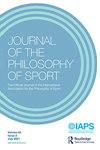简单的游戏仍然是《金装律师》的游戏
IF 1.7
3区 哲学
Q3 ETHICS
引用次数: 0
摘要
人们普遍认为bernard Suits将游戏定义为挑战。本文认为,金装不可能这样做,否则就会破坏他更大的哲学计划。然后,它辩称,他没有这样做。suit从数量上(游戏邦注:如效率高低)而不是定性上(如难度、挣扎)定义游戏玩法。本文最后探讨了这种观点转变的后果。关键词:Bernard suitsgames挑战难度效率披露声明作者未报告潜在利益冲突。这并不是Juul将sutsian理论应用于电子游戏的唯一问题,但却是与此相关的问题。显然,厄普顿不知道《蚱蜢》(The Grasshopper)的第9章到第12章,《金装律师》专门讲述了虚构的故事,以及更普遍的角色扮演游戏。3 . Nguyen (Citation2020)获得美国哲学协会2021年图书奖(见美国哲学协会Citationn.d)。“除了正式和历史因素之外,还有无数个人或特殊原因会让特定玩家觉得游戏很困难”(Jagoda citation2018,207)。参见Strojny等人关于“主观难度”的论述。另见Dziedzic和Włodarczyk (Citation2018, 710-11), Paraschos和Koulouriotis (citation2023,1)。参见Suits (Citation2014, 40)和Boutros (Citation2008)。在这一段中,我模仿了《蚱蜢》(The Grasshopper)第13章中Suits本人的一段论述(Suits引文2014,155)。《金装律师》最初的定义是,游戏规则限制了玩家可用的手段。他的定义的最终版本是,这些规则限制了玩家使用效率较低的手段。事实上,《金装律师》在《生活是我们在玩的游戏吗?》在《蚱蜢的归来》第5.8章中。参见,例如诉讼(Citation1981;9. Citation1989, Citation2004, Citation2006)。这里没有足够的空间来完整地引用这些段落,但这里有相关的术语和它们的位置(全部来自《西装引文》2014)-在第3章:a)第32页:“沉闷”和“容易”;B)第33页:“更难”与“更有效率”;C)第39页:“有效的”d)第39页:“有用的”;E)第40页:“最简单”、“最容易”、“最直接”和“最有效”vs“更复杂”、“更困难”和“更间接”。在第3章之外也有相关的段落:f)第64页:“有效的”;G)第90页:“更困难”;H)第91页:“更容易”与“更难”;I)第91页:“更有效率”与“效率较低”和“困难”;J)第191页:“挑战”,“困难”。他曾经和琼斯在岛上,但他们在玩一个叫做“杀人”的游戏,史密斯“赢了”。本文章由计算机程序翻译,如有差异,请以英文原文为准。
Easy games are still games for Suits
ABSTRACTBernard Suits is commonly thought to have defined games as challenges. This paper argues that Suits could not have done so without ruining his larger philosophical project. It then argues that he did not do so. Suits defined game playing in quantitative terms (i.e. being more or less efficient) not qualitative ones (e.g. difficulty, struggle). The paper concludes by exploring the consequences of this shift in perspective.KEYWORDS: Bernard Suitsgameschallengedifficultyefficiency Disclosure statementNo potential conflict of interest was reported by the author(s).Notes1. This is not Juul’s only problem with applying Suitsian theory to video games, but it is the one that is relevant here.2. Upton, apparently, was unaware of chapters 9 through 12 of The Grasshopper (Suits Citation2014), which Suits devoted to dealing with make-believe specifically, and role-playing games more generally.3. Nguyen (Citation2020) won the American Philosophical Association’s Book Prize for 2021 (see American Philosophical Association Citationn.d.).4. ‘Beyond formal and historical considerations, there are countless personal or idiosyncratic reasons that particular players might find a game difficult’ (Jagoda Citation2018, 207). See Strojny, et al. (Citation2023, 7) on ‘subjective difficulty’. See also Dziedzic and Włodarczyk (Citation2018, 710–11) and Paraschos and Koulouriotis (Citation2023, 1). Cf. also Suits (Citation2014, 40) and Boutros (Citation2008).5. In this paragraph, I imitate a line of argument by Suits himself from chapter 13 of The Grasshopper (Suits Citation2014, 155).6. The original version of Suits’s definition says that the rules of a game limit the means available to players. The final version of his definition says that those rules limit players to means that are less efficient than would otherwise be available.7. In fact, Suits worked ‘Is Life a Game We Are Playing?’ into Return of the Grasshopper as chapter 5.8. See, e.g. Suits (Citation1981; Citation1989, Citation2004, Citation2006).9. There is not enough room to quote these passages in full, but here are the relevant terms and their locations (all from Suits Citation2014) – Within chapter 3: a) p. 32: ‘dull’ and ‘easy’; b) p. 33: ‘harder’ vs. ‘more efficient’; c) p. 39: ‘effective’ d) p. 39: ‘useful’; e) p. 40: ‘simplest’, ‘easiest’, ‘most direct’, and ‘most efficient’ vs. ‘more complex’, ‘more difficult’, and ‘more indirect’. Outside chapter 3 there are also relevant passages: f) p. 64: ‘effective’; g) p. 90: ‘more difficult’; h) p. 91: ‘easier’ vs. ‘more difficult’; i) p. 91: ‘more efficient’ vs. ‘less efficient’ and ‘difficult’; j) p. 191: ‘challenge’, ‘difficult’.10. He used to be on the island with Jones, but they were playing a game called ‘Homicide’ and Smith ‘won’ (Suits Citation2023, 58–59).
求助全文
通过发布文献求助,成功后即可免费获取论文全文。
去求助
来源期刊

Journal of the Philosophy of Sport
Multiple-
CiteScore
1.90
自引率
14.30%
发文量
24
期刊介绍:
The Journal of the Philosophy of Sport (JPS) is the most respected medium for communicating contemporary philosophic thought with regard to sport. It contains stimulating articles, critical reviews of work completed, and philosophic discussions about the philosophy of sport. JPS is published twice a year for the International Association for the Philosophy of Sport; members receive it as part of their membership. To subscribe to either the print or e-version of JPS, press the Subscribe or Renew button at the top of this screen.
 求助内容:
求助内容: 应助结果提醒方式:
应助结果提醒方式:


